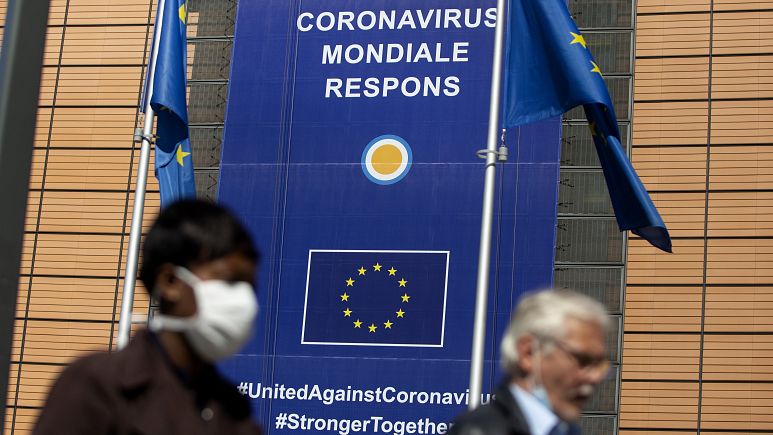EU's financial 'firepower' is 1.85 trillion with 750bn for COVID fund
euronews_icons_loading

The big day has arrived the European Commission has laid out its vision for post-pandemic recovery funds, and it is worth 1.85 trillion euros. The plan relies on both the long-term EU budget (2021-27) and a special recovery fund.
Commission President Ursula von der Leyen is addressing the European Parliament, an effort to persuade MEPs who also get a say on the final plan.
"This is Europe's moment," she said. "We either all go it alone...or we pave a strong path for our people and for the next generation."
"The coronavirus has shaken Europe and the world to its core, testing healthcare and welfare systems, our societies and economies and our way of living and working together. To protect lives and livelihoods, repair the Single Market, as well as to build a lasting and prosperous recovery, the European Commission is proposing to harness the full potential of the EU budget. Next Generation EU of €750 billion as well as targeted reinforcements to the long-term EU budget for 2021-2027 will bring the total financial firepower of the EU budget to €1.85 trillion," she outlined.
Recovery Fund
The EU Commission is proposing a 750 billion euro recovery fund, the Economy Commissioner Paolo Gentiloni tweeted. The money would be divided up into 500 billion euros given to EU countries as grants, the remaining 250 billion euros would be available as loans.
One of the first EU leaders to react is Italy's Guiseppe Conte who said it was an 'excellent signal from Brussels'.
"We were described as visionaries because we believed in it from the beginning. 500 billion in grants and 250 billion in loans are an adequate figure. Now let's speed up the negotiation and free up the resources soon."
The Spanish prime minister said the proposal was a 'starting point for negotiations'. While Emmanuel Macron said it was a 'crucial day' for Europe, adding that his own proposal with Angela Merkel had 'allowed this progress'.
Last week, the German Chancellor and French President set out their proposal for a 500 billion euros recovery fund, something which has caused controversy with the 'frugal four' (Austria, Denmark, Finland, Netherlands). The issue of how much the funding will be linked to grants or loans remains a sticking point.
EU budget 2021-27
EU leaders, MEPs and the Commission are at odds over the total figure for the long-term budget. Pre-coronavirus crisis, 1.1 trillion euros had been the ceiling set by EU leaders. MEPs have called for it to be scaled up to 2 trillion euros, in light of the economic downturn caused by the pandemic. In February, some EU countries sought to keep a more modest budget, although one net contributor, the UK will no longer be paying in. Making up the difference of the Brexit gap in EU funding has been an issue dividing the bloc.
The biggest issue has been on whether the funding should be given in the form of grants or loans.
Grant allocations would go to those hardest hit by the virus like Italy and Spain receiving around €80bn each with others like Greece receiving over €20bn as their economies are likely to be badly hit.
The kick-off date for funding is set to be January 1 2021, although the EU has already set aside funding in the current budget to help with coronavirus fallout.
The Commission stated:
"In order to make funds available as soon as possible to respond to the most pressing needs, the Commission proposes to amend the current multiannual financial framework 2014-2020 to make an additional €11.5 billion in funding available already in 2020.
Green Deal
Green objectives will be tied into the various funding schemes, to ensure that the EU remains on track to becoming carbon neutral by 2050, despite the bloc heading into a 'historic recession'.